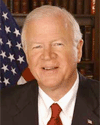New Senate: 51 Democrats 49 Republicans
|
| Dec. 05 | Pickups: | Missouri, Montana, Ohio, Pennsylvania, Rhode Island, Virginia | |
News from the Votemaster
Campaign 2008 is already in full swing. For a run down on the presidential candidates, click here. For a sneak preview at the 2008 Senate races, keep reading.
Senate Races 2008
While the 2008 election is a long way off, one fact stands out right now: the Democrats will be defending 12 seats and the Republicans will be defending 21 seats. No matter what else happens, the Democrats have a lot more targets to shoot at. While a few incumbents may call it quits, by and large being a senator is a cushy job, so few people retire until they hit about 90, or die, whichever comes first. Thus half the cast of characters is known already--the incumbents.
The Democrats best shots at pickups are Norm Coleman (R-MN), Wayne Allard (R-CO), and John Sununu (R-NH). The Republicans best shots at pickups are Mary Landrieu (D-LA) and Tim Johnson (D-SD). One Democrat might retire--Frank Lautenberg (D-NJ), but as many as six Republicans might retire: Wayne Allard (R-CO), Thad Cochran (R-MS), Pete Domenici (R-NM), James Inhofe (R-OK), Ted Stevens (R-AK), and John Warner (R-VA).
Click on a picture for the candidate's home page.
Click on a name for the candidate's entry in the Wikipedia.
Click on a party (D) or (R) for the state party
All off-site references open in a new window. Type CTRL-W in the window to close it.
Seats held by Democrats
Arkansas
| Incumbent | Challenger | Notes |

Mark Pryor (D) |

(R) |
Mark Pryor got only 54% of the vote in 2002, but Arkansas is surpisingly Democratic for a Southern state. Both senators are Democrats, Mike Beebe (D) was just elected governor by 15% and three of the four congressional seats were just won by Democrats. Pryor has a net +24% (approval - disapproval) popularity rating, so unless the GOP finds an exceptionally strong challenger, Pryor is probably safe. Pryor trivia: His father, David Pryor, was an Arkansas senator from 1979 to 1995. |
Delaware
| Incumbent | Challenger | Notes |

Joe Biden (D) |

(R) |
Joe Biden wants to be president. Trouble is, nobody else quite sees it that way, certainly not the junior senators from New York and Illinois. He's been running for the job on and off since 1988, when his campaign was sidetracked after it became known that he pliagiarized a speech from a British politician, Neil Kinnock. He may try to grab the brass ring again, but after his campaign fizzles, he'll settle for a seventh term in the Senate, where he has served since he was 30. |
Illinois
| Incumbent | Challenger | Notes |

Dick Durbin (D) |

(R) |
Dick Durbin is assistant majority leader and obviously wields great power in the Senate. He won in 2002 by 22% and is moderately popular in Illinois (net approval: +13%) although he has made some gaffes. Still, it will be tough to convince the Illinois voters to dump the second most powerful person in the Senate for a minority backbencher who will have no power at all. All in all, Durbin is the solid favorite. |
Iowa
| Incumbent | Challenger | Notes |

Tom Harkin (D) |

(R) |
Tom Harkin is in line to become chairman of the Senate agriculture committee, something of great interest to Iowa's many small farmers. He is somewhat more liberal that the state as a whole. Still, replacing a guy with a lot of power in an area Iowans care about with a newbie with no power seems unlikely. He'll probably be reelected unless the Republicans can find a very strong candidate. |
Louisiana
| Incumbent | Challenger | Notes |

Mary Landrieu (D) |

(R) |
Mary Landrieu is one of the two Democrats who barely squeaked by in 2002, having won in a runoff with 52%. The Republicans have her in their crosshairs. They might try to blame hurricane Katrina on her (or more specifically, her response to it), but that would be playing with fire as she whould would likely then blame the Republican administration. Her net approval rating is +10%--not great--so this is one of the Republicans best chances for a pickup. Landrieu trivia: Her father, Moon Landrieu, was mayor of New Orleans from 1970 to 1978, and her brother is the current Lt. Governor of Louisiana. |
Massachusetts
| Incumbent | Challenger | Notes |

John Kerry (D) |

(R) |
John Kerry is probably going to run for President again, but it is doubtful if he will last long. With Hillary, Obama, Edwards, and a dozen other new faces going after the prize, he will probably be knocked off earlyy enough in 2008 that he can concentrated on being reelected to the Senate. With a +14% net popularity, he is not one of the nation's most loved senators, but it has been decades since Massachusetts sent a Republican to the Senate. |
Michigan
| Incumbent | Challenger | Notes |

Carl Levin (D) |

(R) |
Carl Levin will be chairman of the Armed Services committee in the new Senate. That's the committee that deals with wars and stuff like that. Expect to see a lot of Carl on TV next year. How is a Repblican opponent going to top a Senate committee chairman denouncing the increasingly-unpopular war in Iraq? By supporting the war? That won't work in Michigan. Levin is safe. |
Montana
| Incumbent | Challenger | Notes |

Max Baucus (D) |

(R) |
A lot of liberal Democrats dislike Max Baucus because he is quite conservative and often works with the Republicans. In the new Senate, he will be chairman of the powerful finance committee, which writes the tax laws. He has approved of most of the Bush tax cuts, which clearly antagonizes part of the party. On the other hand, in part due to his positions, he had a 32% margin over his Republican opponent in 2002 (vs. 1% for Jon Tester in Nov. 2006), so it will be nearly impossible for the Republicans to unseat him. Of course the Democrats could try fratricide. maybe by convincing Ned Lamont he needs to move to the wide open spaces, but it didn't work in Connecticut and it won't work in Montana. |
New Jersey
| Incumbent | Challenger | Notes |

Frank Lautenberg (D) |

(R) |
If Frank Lautenberg runs again and wins, he will be be three weeks short of his 91st birthday when his term ends. Even by Senate standards, this is getting on in years. He was first elected to the Senate in 1982, then he was reelected in 1988. In 1994, the year of the Republican revolution, he got reelected a third time. When that term ended in January 2001, he retired from politics. However, in 2002, incumbent Sen. Bob Torricelli got caught with his hand in the cookie jar and it looked like the Democrats might lose a safe seat. The party elders implored him to go for another hurrah, so Torricelli departed, Lautenberg entered, and the Democrats held New Jersey. There is a good chance that he might really retire this time. If he announces it early enough for another candidate to be found, the Democrats can probably hold this seat. After all, Tom Kean, Jr., son of a popular governor, took a real beating at the hand of Sen. Bob Menendez in 2006, despite all the corruption charges swirling around Menendez. |
Rhode Island
| Incumbent | Challenger | Notes |

Jack Reed (D) |

(R) |
Jack Reed is a quiet kind of guy who is rarely in the news. But he is immensely popular in highly Democratic Rhode Island, having won his fourth term in 2002 78% to 22%. With a net +38% approval rating, the Republicans will be lucky if they can find a sacrificial lamb to run against him. |
South Dakota
| Incumbent | Challenger | Notes |

Tim Johnson (D) |

(R) |
Tim Johnson is one of the two most endangered Democratic senators. He got just 50% of the vote in 2000 against John Thune, who ran again in 2004 and beat Tom Daschle. Furthermore, South Dakota is a heavily Republican state, although its lone member of the House is a Democrat, Stephanie Herseth. But in all fairness, Herseth is a special case, having been grandfathered into the job to some extent--her grandfather, Ralph Herseth, was a popular governor of the state. Johnson will chair the Senate ethics committee, which could put him on the hot seat, but it also gives him a platform to go after unethical senators (if any exist). Despite his narrow win in 2002, Johnson has a +46% net approval rating, so the people of South Dakota like the way he is doing his job. Still, this seat and Mary Landrieu's in Louisiana will be the Republicans best (maybe only) chances for pickups. |
West Virgina
| Incumbent | Challenger | Notes |

Jay Rockefeller (D) |

(R) |
How the grandson of John D. Rockefeller ended up in dirt-poor West Virginia is a bit of an oddity. After studying Far Eastern languages at Harvard and then spending three years in Japan, he joined the Peace Corps, where he met Bobby Kennedy. Then he joined VISTA and moved to West Virginia. Eventually he decided he could do more for West Virginians top down than bottom up, so he ran for the House of Delegates and won. Later he was elected Secretary of State, Governor, and finally in 1984 to the U.S. Senate. He won his fourth term in 2002 by 26% and will probably win his fifth term in 2006 by a similar margin. Rockefeller trivia: His uncle, Nelson Rockefeller, was Vice President, and his father in law, Charles Percy, was senator (R-IL). |
Seats held by Republicans
Alabama
| Incumbent | Challenger | Notes |

Jeff Sessions (R) |

(D) |
Alabama is a very Republican state and Jeff Sessions is reasonably popular, with a net approval rating of +19%. It is unlikely the Democrats can muster a strong opponent, so Sessions will coast easily to a third term. |
Alaska
| Incumbent | Challenger | Notes |

Ted Stevens (R) |

(D) |
If you Google "The bridge to nowhere" you will find over 80,000 hits, all of them describing Ted Stevens' pet project of spending $320 million of the taxpayers money to build a bridge from Ketchikan (pop. 8900) to its airport, to spare its residents a $6 ferry ride. Outside of Alaska he is the poster boy for pork barrel legislation gone berserk, but within the state he is seen as the guy who is trying to bring home the bacon. Despite his being the object of national ridicule, he is the President pro tempore of the Senate until 110th Senate meets, when Robert Byrd will take over. However, besides being a laughingstock, Stevens has another problem: age. He will be 91 at the end of his next term and Alaska is a relative young state. He might retire, but if he doesn't, his opponent will undoubtedly say he is too old to represent Alaska. |
Colorado
| Incumbent | Challenger | Notes |

Wayne Allard (R) |

(D) |
When he was first elected in 1996, Wayne Allard promised to serve only two terms. We will soon find out if he intends to keep his promise. The fact that he has a -4% net approval rating may influence his decision: it looks better to go gracefully keeping your promise than to break it and be defeated. Colorado has been trending Democratic in recent years. While George Bush carried the state by 6% in 2004, Colorado also elected Ken Salazar (D) to the Senate the same year and just elected Bill Ritter (D) governor by 15%. Furthermore, the Democrats control both houses of the state legislature. Colorado will be the Democrats' number 2 target in 2008 (after Minnesota). Rep. Mark Udall and Denver mayor John Hickenlooper are the most likely Democratic challengers. Allard trivia: Allard is one of the two veterinarians in the Senate. The other is John Ensign (R-NV). |
Georgia
| Incumbent | Challenger | Notes |

Saxby Chambliss (R) |

(D) |
Saxby Chambliss ran an extraordinarily mean-spirited campaign in 2002, accusing decorated Vietnam veteran and triple amputee Max Cleland of lacking patriotism. Chambliss also paired pictures of Cleland with Osama bin Laden and Saddam Hussein. Chambliss won by 7% and his net approval rating has stayed at that level. Still, Georgia is a conservative state and unless the Democrats find a stellar candidate, Chambliss is likely to win a second term. |
Idaho
| Incumbent | Challenger | Notes |

Larry Craig (R) |

(D) |
Larry Craig is a fairly low-profile conservative Republican. He is popular back home and won relection in 2002 by a 22% margin. Despite a good (but ultimately unsuccesful showing) in the ID-01 congressional race, Idaho is not a Democrat-friendly state. Craig will be reelected easily. |
Kansas
| Incumbent | Challenger | Notes |

Pat Roberts (R) |

(D) |
Pat Roberts is a staunch conservative in a highly conservative state. He ran unopposed in 2002, winning a second term then. Maybe the Democrats will find a sacrificial lamb this time, maybe they won't. It doesn't matter. Pat Roberts will coast to a third term. |
Kentucky
| Incumbent | Challenger | Notes |

Mitch McConnell (R) |

(D) |
Although Democrats picked up a House seat in Kentucky in 2006, the state remains fairly conservative. Mitch McConnell matches the state well and as minority leader in the 110th Senate will wield considerable influence. He is unlikely to face much of a challenge for his fifth term. McConnell trivia: his first name is Addison but he goes by "Mitch" (his middle name is Mitchell). Despite the separation of powers mandated by the constitution, McConnell is intimately intertwined with the executive branch: he married to Secretary of Labor Elaine Chao, the only member of the original Bush cabinet still in office. |
Maine
| Incumbent | Challenger | Notes |

Susan Collins (R) |

(D) |
Susan Collins represents a dying breed: moderate Republicans from the Northeast. New England used to be run by them, but they have suffered major losses in recent years. Collins is personally very popular, but so was Lincoln Chafee in Rhode Island, and it didn't save him. Nevertheless, unless the Democrats can come up with a wildly popular candidate, Collins will probably get a third term. |
Minnesota
| Incumbent | Challenger | Notes |

Norm Coleman (R) |

(D) |
Norm Coleman will be the Democrats top target in the Senate in 2008. He won his seat in 2002 by a tiny margin after his Democratic opponent, Paul Wellstone, was killed in a plane crash two weeks before the election. The Democrats hastily got former Vice President Walter Mondale to take Wellstone's slot on the ticket, but Mondale was unable to do what Frank Lautenberg pulled off in New Jersey--suddenly jump in and win. Both parties are keenly aware that in Nov. 2006, Hennepin County Attorney Amy Klobuchar (D) crushed Rep. Mark Kennedy (R) by over 20% for an open Senate seat. |
Mississipi
| Incumbent | Challenger | Notes |

Thad Cochran (R) |

(D) |
Despite being the first Republican to win statewide office since Reconstruction, Thad Cochran is a low-profile senator, far less widely known than his Mississippi colleague Trent Lott. In 2005 he was appointed chairman of the powerful Senate Appropriations Committee, which handles spending bills. Think of the chairman as Mr. Pork. T Unfortunately for Cochran, with the change of power, Robert Byrd will be the new chairman, greatly diminishing Cochran's power (new military bases go to West Viginia instead of Mississippi). Given that he will be 87 at the end of a new term, he might just retire in 2008. Still, given Mississippi politics, it is unlikely the Democrats could capture even an open seat there. |
Nebraska
| Incumbent | Challenger | Notes |

Chuck Hagel (R) |

(D) |
Chuck Hagel has been toying with the idea of running for President for some time now. If he retires from the Senate to make a run, it is likely some other Republican will capture this seat, despite Democrat Ben Nelson just being reelected to the other Nebraska seat. If Hagel decides to drop his presidential bid (or loses early on), he is a shoo-in for reelection. |
New Hampshire
| Incumbent | Challenger | Notes |

John Sununu (R) |

(D) |
John Sununu had not really been on the radar until Nov. 7, 2006, when a political tsunami hit New Hampshire. John Lynch (D) was reelected to a second two-year term with an incredible 74% of the vote, the largest percentage in a gubernatorial race in state history. A totally unknown antiwar activist, Carol Shea-Porter (D), defeated incumbent congressman Jeb Bradley (R) in NH-01 and lawyer Paul Hodes (D) defeated incumbent congressman Charlie Bass (R) in HN-02. The Democrats also swept to power in both houses of the state legislature for the first time since 1874. In this climate, if Gov. Lynch decides to run for the Senate instead of for governor in 2008, Sununu is in deep dudu. Sununu trivia: His father was governor of New Hampshire and Bush 41's chief of staff. |
New Mexico
| Incumbent | Challenger | Notes |

Pete Domenici (R) |

(D) |
New Mexico is truly a swing state. In presidential races, it is split right down the middle. It also has one Democratic senator (Jeff Bingaman) who wins in landslides and one Republican senator (Pete Domenici) who wins in landslides. If Pete Domenci decides to run for relection in 2008, he will easily win a seventh term. However, at the end of that seventh term he will be 82 and he has been in ill health for some time. If he retires, it will be a free for all here. Domenici trivia: He used to be a junior high school math teacher. |
North Carolina
| Incumbent | Challenger | Notes |

Elizabeth Dole (R) |

(D) |
Liddy Dole did a spectacularly bad job as head of the NRSC recruiting strong senatorial candidates to challenge weak Democratic senators, such as the Nelson boys. Will the people of North Carolina blame her for losing the Senate? Probably not since most people (except politicians and political junkies) have never even heard of the NRSC. She won by 9% in 2002 and has a +20% net approval rating, so if she decides to stay in the Senate, she will probably be re-elected. Dole trivia: Her husband was a long-time senator from Kansas and the losing Republican presidential candidate in 1996. Then he switched from elections to erections and became the national spokesman for Viagra. |
Oklahoma
| Incumbent | Challenger | Notes |

James Inhofe (R) |

(D) |
James Inhofe is a staunch conservative who opposes abortion, gay marriage, and measures to combat global warming. As senator he doesn't have much influence on the first two, but as outgoing chairman of the Committee on the Environment and Public Works, he had a lot of influence on the latter. He is going to be truly dismayed watching the new chairwoman, Barbara Boxer (D-CA), one of the most liberal members of the Senate, try to undo everything he did as fast as she possibly can. If he runs for reelection, he will win in a walk, but he would be 80 at the end of the term and might decide to retire. While Oklahoma is generally a fairly Republican state, if Inhofe retires, the vacancy will surely attract the attention of Gov. Brad Henry (D), who was just reelected by a 33% margin. |
Oregon
| Incumbent | Challenger | Notes |

Gordon Smith (R) |

(D) |
Gordon Smith is a moderate senator in a state that is trending Democratic. Although he won by 16% in 2002, his net approval rating is only 11%. While he has a decent chance of being reelected, a strong Democratic opponent could run the same campaign against him that senator-elect Sheldon Whitehouse (D) ran against Lincoln Chafee (R) in Rhode Island: "Smith is a nice guy but do you want Mitch McConnell to be majority leader?" Right now, the race leans Republican, but that could change if a strong challenger emerges. |
South Carolina
| Incumbent | Challenger | Notes |

Lindsey Graham (R) |

(D) |
South Carolina is a very Republican state, so Lindsey Graham is not in much danger. He is highly visible and should be reelected easily. Graham trivia: Graham has never been married. |
Tennessee
| Incumbent | Challenger | Notes |

Lamar Alexander (R) |

(D) |
Lamar Alexander is a moderate who survived a bitter primary in 2002, but won the general election by 10%. However, his net approval rating is now down to +3%, so he might be vulnerable, especially if Harold Ford, Jr., who came close to winning Bill Frist's seat in 2006, runs again. However, at this point, the odds favor Alexander. |
Texas
| Incumbent | Challenger | Notes |

John Cornyn (R) |

(D) |
John Cornyn is a staunch conservative and close ally of President Bush. As a consequence, as Bush's popularity drops, so does Cornyn's. Most recently his net approval rating dipped to -3%, a warning sign for any incumbent. Many people wondered why lawyer Barbara Radnofsky bothered to run for the Senate in 2006 against the immensely popular Kay Bailey Hutchison, but the answer may be that the 2006 campaign was simply a warmup for the real race, in 2008 against the far less popular Cornyn. |
Virginia
| Incumbent | Challenger | Notes |

John Warner (R) |

(D) |
John Warner can represent Virginia in the Senate until the cows come home if he wants to. He is extremely popular there and ran unopposed in 2002. He is also one of the Senate's old bulls and with a long and distinguished career behind him and is beholden to no one, certainly not to an unpopular lame duck President. As outgoing chairman of the Senate Armed Services committee, he wielded a lot of clout, which he will now have to cede to incoming chairman Carl Levin (D-MI). The one thing Republicans have to worry about is a possible Warner retirement. He would be 87 at the end of another term, and might feel this is a good time to call it quits. If so, this seat will be hugely competitive, what with Tim Kaine (D) just being elected governor of Virginia and Jim Webb (D) just being elected senator from Virginia. Warner trivia: Warner is the only senator to have been married to the much-married Elizabeth Taylor (1976-1983). |
Wyoming
| Incumbent | Challenger | Notes |

Michael Enzi (R) |

(D) |
Michael Enzi is a staunch conservative. Even though he represents a state with much natural beauty, he has consistently received a 0% rating from the League of Conservation Voters. Nevertheless, he won relection in 2002 by a 46% margin and should win easily in 2008. |
Projected New House: 232 Democrats 201 Republicans 2 Ties
Dem pickups: AZ-05 AZ-08 CA-11 CO-07 CT-02 CT-05 FL-16 FL-22 IA-01 IA-02 IN-02 IN-08 IN-09 KS-02 KY-03 MN-01 NC-11 NH-01 NH-02 NY-19 NY-20 NY-24 OH-18 PA-04 PA-07 PA-08 PA-10 TX-22 WI-08
GOP pickups:
If you like this site, please announce it to news groups and blogs and tell your friends about it. If you have your own blog, please click on "For bloggers" above.
-- The Votemaster